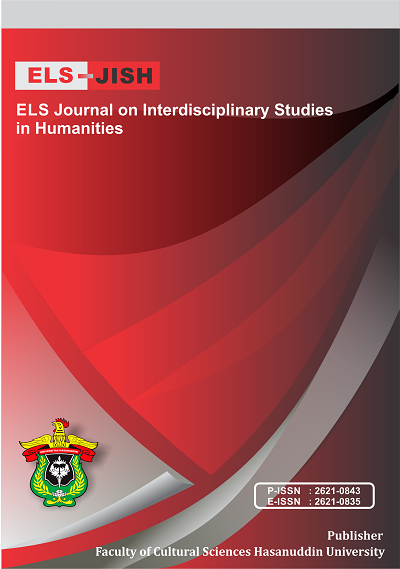Pragmatic Analysis of 2019 Nigerian Presidential Election-Related Newspaper Cartoons
DOI:
https://doi.org/10.34050/elsjish.v6i1.24983Keywords:
Political Discourse, Pragmatics, Presidential Election-related CartoonsAbstract
This study undertook a pragmatic analysis of the 2019 Nigerian Presidential Election-Related Newspaper Cartoons to establish the central issues, their contextual underpinning, the engendering pragmatic acts and strategies and their implication to media, society and politics. It was designed to address the knowledge gap created by extant studies which evaded the appraisal of this slant of political discourse that would provide a better understanding of the political cartoons. To address this issue, the paper adopted the Pragmatic acts theory and the theory of social semiotics to account for the ensuing issues and their semiotic significance. The descriptive research design was adopted with a purposive sampling technique to allow for a qualitative analysis of the data selected for the study. Twenty-five cartoons were purposively selected for this paper. The selection was premised on the critical issues that tainted the general elections of 2019. These were subjected to pragma-semiotic analysis. Three discourse issues were identified – partisan contest, electoral fraud, and corruption. These were constrained by six contexts, which are the contexts of rivalry, game, defeat, victory, corruption, and war with the pragmatic acts of satirizing, warning, and sensitizing, strategically crystalized through the strategies of negative lexicalization of opposition, satirisation of politicians’ identity, and invocation of actor’s precedence. It, therefore, concludes on the note that it takes more than a literal sense to understand the construction of political cartoons of criticism and thus needs conscious efforts to unravel the issues and pragma-semiotic means of decoding them. The study hence recommends that political cartoon studies should be initiated and their proliferation should be censored due to their sensitive construction of reality and its implication for media, politics and society.Downloads
References
Agu, M. (2015). Pragmatic Analysis of ‘Leadership’ Cartoons in Selected Nigerian Dailies. Department of English, IBB University, Lapai.
Amir P.,M., Sukmawati, Rahman, F.F., & Andini, C. (2023). Symbolic Violence and Woman’s Resistance Reflected in “Legally Blonde” Novel by Amanda Brown. Journal of Positive Psychology & Wellbeing, 7(2), 556–564.
Andini, C., Sosrohadi, S., Fairuz, F., Dalyan, M., Rahman, F. F., & Hasnia, H. (2022). The Study of Japanese Women in the Facial Treatment Advertisement: A Semiotics Perspective of Pierce’s Theory. ELS Journal on Interdisciplinary Studies in Humanities, 5(2), 337-347.
Genova, D. (2018). Grasping political cartoons?. The European Journal of Humour Research, 6(1), 85-99.
Mey, J. (2001). Pragmatics: an Introduction. 2nd Ed. USA: Blackwell Publishing.
Odebunmi, A. (2009). Politeness in Print Media Political Interviews in Nigeria. California Linguistic Notes. Volume XXXIV, No. 1.
Peirce, C. S. (1985). Logic as Semiotic: The Theory of Signs, In: R. E. Innis (ed.) Semiotics: An Introductory Anthology. Bloomington: Indiana University Press.
Prihandoko, L. A., Tembang, Y., Marpaung, D. N., & Rahman, F. (2019). English language competence for tourism sector in supporting socio-economic development in Merauke: A Survey Study. In IOP Conference Series: Earth and Environmental Science (Vol. 343, No. 1, p. 012170). IOP Publishing.
Rahman, F. (2018). The Constraints of Foreign Learners in Reading English Literary Works: A Case Study at Hasanuddin University. Journal of Arts and Humanities, 7(2), 01-12.
Rahman, F., & Amir, P. (2019). Trends in Reading Literary Fiction in Print and Cyber Media by Undergraduate Students of Hasanuddin University. International Journal of Education and Practice, 7(2), 66-77.
Rahman, F., Sutanto, T. E., & Fitriyati, N. (2021). Web Traffic Anomaly Detection using Stacked Long Short-Term Memory. InPrime: Indonesian Journal of Pure and Applied Mathematics, 3(2), 112-121.
Shaikh, N. Z., Tariq, R., & Saqlain, N. U. S. (2019). Cartoon war….. A political dilemma! A semiotic analysis of political cartoons. Journal of Media Studies, 31(1).
Sani, I., Abdullah, M. H., Abdullah, F. S., & Ali, A. M. (2012). Political cartoons as a vehicle of setting social agenda: The newspaper example. Asian Social Science, 8(6), 156.
Swain, E. (2012). Analysing evaluation in political cartoons. Discourse, Context & Media, 1(2-3), 82-94.
Usman, S., & Momoh T. (2016). Satire as Tool of Political Cartoons in the Nigerian National Dailies: A Critical Discourse Analysis. European Scientific Journal. 12(29): 23-32.
Weda, S., Atmowardoyo, H., Rahman, F., & Sakti, A. E. F. (2021). Linguistic aspects in intercultural communication (IC) practices at a higher education institution in Indonesia. Eroupean Language Scientific Journal, 14, 2-6.
Downloads
Published
How to Cite
Issue
Section
License
Copyright (c) 2023 Oluwafemi Jolaoso, Oluwadamilola Shojonwo

This work is licensed under a Creative Commons Attribution-ShareAlike 4.0 International License.

















